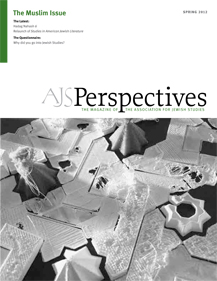Dear Colleagues,
Twenty-four years ago, when I first presented a paper at an AJS conference, I had no notion that this organization would come to play such an important role in my professional life, let alone that one day I would be asked to serve as its president. This was not simply because it was very early in my academic career, but also because the field of Jewish Studies looked quite different then. As a scholar interested in contemporary popular culture (my first paper examined American Jewish self-portraiture on television), my place within the field seemed to be at the margins.
Since then, AJS became vital to my development as a scholar, as I engaged in lively debate during conference sessions, wrote for AJS publications, and met people who have become cherished colleagues. Through AJS I have also watched with great interest how the field of Jewish Studies has developed: in the broader range of subjects, disciplines, and methodologies undertaken by scholars in the field, the forging of new connections between Jewish Studies and other areas of study, and discussions of the field's shifting concerns and expanding sense of the possible.
Increasingly, AJS fosters a scholarly environment in which work once thought peripheral to the field of Jewish Studies is flourishing alongside more established areas of scholarship. Moreover, this learned society's various undertakings bring scholars across a wide spectrum of interests into conversation with one another, as they embrace the notion that such an expansive understanding of Jewish Studies is in the best interests of the field. As president of AJS, I look forward to enhancing this engagement among the diverse array of scholars in Jewish Studies.
This spirit of thoughtful scholarly adventurousness is at the core of what attracted me to the field of Jewish Studies in the first place— something brought acutely to mind several days after the 2011 AJS conference by news of the passing of Adrienne Cooper, a treasured member of the Jewish Studies community. Adrienne is likely best remembered as one of the leading performers of Yiddish song of her generation, but music was only one of the spheres of activity in which she made vital contributions. As a committed builder of Jewish scholarly, cultural, and communal institutions, she played a strategic role in the field of Yiddish Studies, especially during the 1970s and '80s. Like many other Jewish Studies scholars, I first met Adrienne when she was Assistant Dean of the Max Weinreich Center for Advanced Jewish Studies at the YIVO Institute for Jewish Research. Thanks largely to her encouragement, my initial curiosity about Yiddish was transformed into an academic career. I was far from alone in benefiting from Adrienne's intellectual and moral support. In the days following her death I spoke with or heard from some of the many other scholars for whom she provided the point of entry to studying Yiddish and to applying it to their work in fields ranging from history and literature to linguistics and ethnomusicology. Like these colleagues, much of what I found exciting about Yiddish Studies was the multidisciplinary community it attracted. In courses, seminars, conferences, and other undertakings, Adrienne helped bring together diverse scholars from around the world, junior as well as senior, working in disciplines across the humanities and social sciences. She also fostered close ties between scholars and artists—musicians, actors, filmmakers, visual artists, and others—and modeled how they might learn from one another and work together in her own undertakings as a performer, writer, translator, and teacher. For me, this lively, creative environment was as attractive and as formative as the subject matter at hand. This milieu emerged at a crucial moment for both the creation and the study of Yiddish culture. At the time, many people saw this culture as having more or less ended, and the place of Yiddish Studies was much less established in the academy than it has since become. As a central figure in this scene, Adrienne brought both scholarly acumen (as a PhD candidate in History at the University of Chicago) and a musician's creative energy to the nurturing of academic and artistic communities. A generation of scholars, writers, translators, performers, media artists, public culture workers, and others involved with Yiddish culture is indebted to her efforts on its behalf and to the vision of new possibilities for engaging with Yiddish that she epitomized.
This vision continues to inform how I work as a Jewish Studies scholar. In addition to the enrichment that comes from working across disciplines, I have found opportunities to engage with artists of all kinds to be especially gratifying—not only to learn about their careers but also to better understand how their work figures in contemporary Jewish life. These encounters have inspired me to integrate academic rigor with artistic creativity, striving to produce work that is deeply informed and at the same time takes innovative chances. Similarly, I've found exploring the nexus of the academy and the public sphere to be intellectually rewarding—and, at times, challenging—whether by contributing to public culture in the form of exhibitions, public programs, and other endeavors, or by studying these practices.
These are possibilities not only for someone working in Yiddish Studies or on contemporary Jewish culture but for scholars in any area of Jewish Studies. Moreover, these possibilities can enhance how scholars think about Jewish Studies as a wide-ranging field with a complex relationship to the public sphere. These possibilities can inform how we continue to develop what AJS does at its annual conference, in its publications, and in other initiatives under way, such as the AJS Distinguished Lectureship Program. In my term as president of AJS, I look forward to working with all of you on enriching this lively intellectual environment and advancing what makes Jewish Studies such a rewarding, engaging field.
Jeffrey Shandler
Rutgers University

